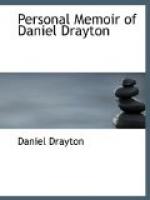“Carlisle (rising suddenly and stepping forward).—I am sure your honor must be laboring under some strange misapprehension. Born and bred and expecting to live and die in a slave-holding community, and entertaining no ideas different from those, which commonly prevail here, I have watched the course of my associate’s argument with the closest attention. The point he is making, I am sure, is most pertinent to the case,—a point it would be cowardice in the prisoner’s counsel not to make; and I must beg your honor to deliberate well before you undertake to stop the mouths of counsel, and to take care that you have full constitutional warrant for doing so.
“Judge Crawford.—I
can’t permit an harangue against
slavery.”
Mr. Mann proceeded to explain the point at which he was aiming. He had read these extracts from Mr. Foote’s speech, delivered to a miscellaneous collection of blacks and whites, bond and free, assembled before the Union office, as showing to what exciting influences the slaves of the District were exposed, independently of any particular pains taken by anybody to make them discontented; and, with the same object in view, he proposed to read some further extracts from other speeches delivered on the same occasion.
“District Attorney.—If
this matter is put in as
evidence, it must first be
proved that such speeches
were delivered.
“Mann.—If
the authenticity of the speeches is denied,
I will call the Honorable
Mr. Foote to prove it.
“District Attorney.—What
newspaper is that from which
the counsel reads?
“Mann (holding
it up).—The Washington Union,
of
April 19th.”
And, without further objection, he proceeded to read some further extracts.
He concluded by urging upon the jury that this case was to be viewed merely as an attempt of certain slaves to escape from their masters, and on my part an attempt to assist them in so doing; and therefore a case under the statute of 1796, punishable with fine; and not a larceny, as charged against me in this indictment.
Several witnesses were called who had known me in Philadelphia, to testify as to my good character. The District Attorney was very anxious to get out of these witnesses whether they had never heard me spoken of as a man likely to run away with slaves? And it did come out from one of them that, from the tenor of my conversation, it used sometimes to be talked over, that one day or other it “would heave up” that I had helped off some negro to a free state. But these conversations, the witness added, were generally in a jesting tone; and another witness stated that the charge of running off slaves was a common joke among the watermen.




